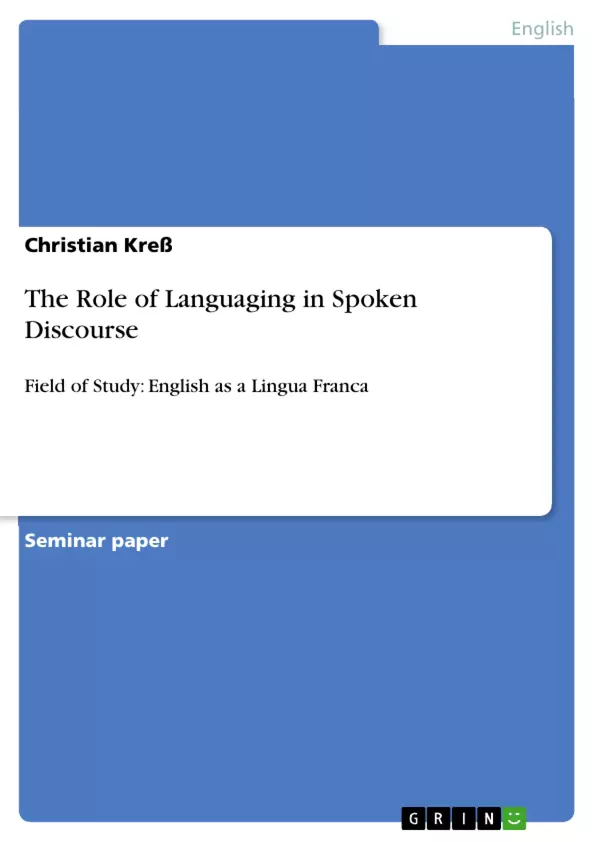The core of this paper is an empirical study in which non-native speakers of English were interviewed and asked to engage in “languaging” about their spoken linguistic output. The theoretical foundation of the empirical study primarily lies in Merrill Swain’s research on the output hypothesis in which she considers the activity of producing language – which she later defines as “languaging” – to be of high importance for making progress in SLL. The purpose of this paper is two-fold: First it primarily supports the view that languaging can be an effective tool for language learning and eventually proposes its implementation in modern SLL. The empirical study is going to show that languaging can fulfil the metalinguistic function of Merrill Swain’s output hypothesis. Second, this paper aims to raise both L2 learners’ and teachers’ awareness of the fact that many errors that trigger the need for languaging result from interferences of one’s mother tongue or even another foreign language with the target language.
Inhaltsverzeichnis (Table of Contents)
- Introduction
- Output processing and languaging
- An Empirical Study of Languaging in Oral Interviews
- Objectives and Approach
- Speaker Profiles
- Errors
- François
- Tatjana
- Languaging Behavior
- François
- Tatjana
- Conclusion and Suggestions for the Implementation of Languaging in SLL
Zielsetzung und Themenschwerpunkte (Objectives and Key Themes)
This paper presents an empirical study that investigates the use of "languaging" in oral interviews with non-native English speakers. The study draws on Merrill Swain's output hypothesis, which posits the significance of language production in second language learning. The paper's primary objectives are to demonstrate the effectiveness of languaging as a language learning tool and to advocate for its implementation in modern SLL. Additionally, the paper aims to raise awareness about the role of interferences from the mother tongue or other languages in causing linguistic errors that trigger the need for languaging.
- The role of languaging in second language learning
- The relationship between output processing and language acquisition
- The impact of interferences from the mother tongue on linguistic errors
- The metalinguistic function of languaging in promoting language awareness
- Implications of languaging for language teaching practices
Zusammenfassung der Kapitel (Chapter Summaries)
- Introduction: This chapter introduces the empirical study and its theoretical foundation, which is based on Merrill Swain's research on the output hypothesis. It emphasizes the significance of languaging for language learning and aims to demonstrate its effectiveness in fulfilling the metalinguistic function of Swain's output hypothesis.
- Output processing and languaging: This chapter discusses Merrill Swain's output hypothesis and its significance for second language learning. It contrasts Swain's theory with Stephen Krashen's input hypothesis, highlighting the role of output in pushing learners towards grammatical accuracy and promoting language awareness. It also explores the three functions of producing output: noticing/triggering, hypothesis testing, and metalinguistic reflection. The chapter introduces the concept of languaging and its connection to Vygotsky's sociocultural theory of mind.
Schlüsselwörter (Keywords)
This paper focuses on the concept of languaging, its role in second language learning (SLL), and its connection to Merrill Swain's output hypothesis. The key themes include output processing, language production, metalinguistic awareness, interferences from the mother tongue, and implications for language teaching practices.
Frequently Asked Questions
What is "languaging" in the context of language learning?
Languaging is the activity of producing language (spoken or written) to mediate cognitively complex activities. It involves learners talking about their own linguistic output to gain deeper understanding and awareness of the language.
What is Merrill Swain’s output hypothesis?
Swain's hypothesis posits that producing language (output) is just as important as receiving it (input). Output performs three functions: noticing/triggering gaps in knowledge, hypothesis testing, and metalinguistic reflection.
How does languaging help correct linguistic errors?
By engaging in languaging, learners become aware of interferences from their mother tongue or other foreign languages, allowing them to consciously process and correct errors in the target language.
What is the metalinguistic function of the output hypothesis?
The metalinguistic function involves using language to reflect on language itself. It helps learners internalize grammatical rules and improves linguistic accuracy through conscious reflection.
Can languaging be implemented in modern language teaching (SLL)?
Yes, the paper advocates for its implementation as an effective tool to raise language awareness and help non-native speakers overcome persistent errors through oral interviews and reflective practices.
- Arbeit zitieren
- Christian Kreß (Autor:in), 2008, The Role of Languaging in Spoken Discourse, München, GRIN Verlag, https://www.hausarbeiten.de/document/175812


